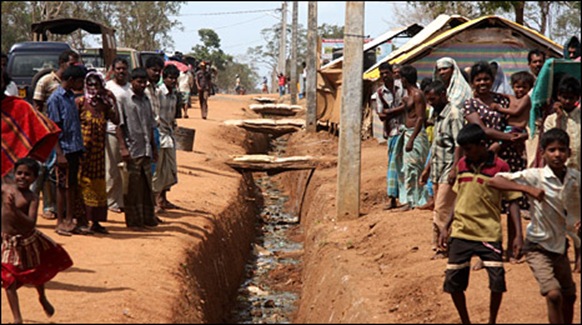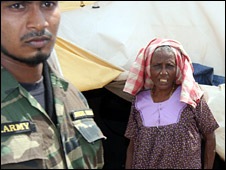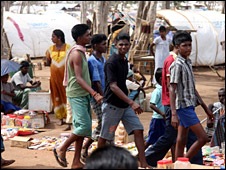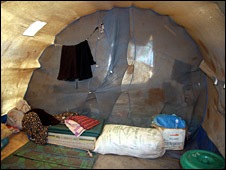 It has been likened to a huge new city in the jungle.
It has been likened to a huge new city in the jungle.
Rapidly built up for the Tamil refugee influx last spring, Menik Farm has pylons, banks, even cash machines – and thousands upon thousands of tents in the cleared arid lands west of Vavuniya in northern Sri Lanka.
Since my earlier visit in April, the camp has swollen to cover some 10 zones, the number of camp-dwellers has ballooned to a quarter of a million, while over 20,000 have been resettled or more informally released, the government says.
This was the BBC’s first chance to view all this infrastructure close-up.
In Zone 2, apparently the most overcrowded, a network of drainage ditches has been built which the government says will prevent flooding in the coming monsoon season.
Shops and little stalls line the straight roads. The stalls are a rare chance for camp-dwellers to earn a bit of cash. The shops were run by the government, we were told.
Even though, according to those we met, many people cannot afford to shop in them, the facilities help give an air of normality to parts of the camp.
Distressing conversations
A government intensely sensitive to outside criticism or suggestions, and wary of any outsider’s intentions in wanting to visit the camps, was now giving the BBC admittance, alongside the UK’s Development Minister, Mike Foster. That in itself seemed like notable progress.
 And yet, just five minutes of conversation with the camp-dwellers was deeply distressing.
And yet, just five minutes of conversation with the camp-dwellers was deeply distressing.
Starting by talking to us through our car-window, women, one after the other, piled on tales of hopelessness in the Tamil language.
Each wanted her turn at the microphone to speak out. There was barely time for us to ask questions or ask where their families were.
One said that after being displaced 15 times by the civil war in three years, and being rescued by the army, she was now sharing a tent with 24 people.
"I don’t know how to live like this," she said, simply. "Please send us to a good place, or to our homes."
There seemed to be a widespread assumption that as outsiders we could somehow send them home. It was a cry of despair.
"There is nothing to do," the same woman lamented.
 "We are falling sick of doing nothing. Even the children who study don’t have books, pens, pencils."
"We are falling sick of doing nothing. Even the children who study don’t have books, pens, pencils."
"There is no water to drink. There is no water to bathe. We are going to die here."
Everyone criticised the food provisions. Dal, rice, flour and sugar did not amount to proper meals, they said.
They also said they lacked pots and pans to cook, even tumblers to drink from.
Another woman said that by staying in these tents people were falling prey to many diseases.
"It’s really hot here. It’s really packed. Please send us to our homes," she told us.
"See that water? It’s from the river. Can a man bathe in that water? It’s the water in which the buffaloes bathe."
‘No room’
An elderly woman insisted we come with her to her tent. She showed us her pitifully thin husband, who cowered on the ground in an improvised lean-to.
 "There is no room for all seven of us in the tent; no place to sleep," she cried.
"There is no room for all seven of us in the tent; no place to sleep," she cried.
"He is sick. He was discharged from the hospital and now he stays here. I am taking him from hospital to hospital, but even in the hospitals there’s no room."
We watched people filling their water containers from a tap in a plastic tank. There were irritable altercations.
A man volunteering to monitor the water distribution said people were fighting for limited rations amounting to about 20 litres per family for three days.
"It’s not enough at all," he said, with severe understatement, adding that sometimes the supply lorries did not deliver the quantities they were supposed to, forcing people to look for water elsewhere.
Earlier the visiting British minister had seen positive things – for instance, mine clearance to the north-west.
Mr Foster said he thought the Sri Lankan government was "desperately keen" to get people back to these communities for monsoon rice-planting.
All the more reason to let people out, at least to stay with host families, he said.
But the authorities are sticking to their message that these refugees, young and old, have to be screened for possible links to the defeated Tamil Tigers. Tens of thousands have yet to be vetted.
Furthermore, people cannot just go back to areas from which landmines had not been cleared, according to Northern Province Governor Maj Gen G A Chandrasiri, who was until recently in charge of Menik Farm.
"The government is doing the best that the government can do," he said.
But by the dirt track in the camp, a refugee disagreed.
"They are not taking this issue seriously," he said.
(For updates you can share with your friends, follow TNN on Facebook and Twitter )
